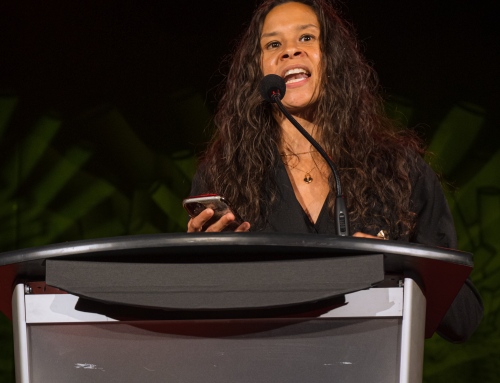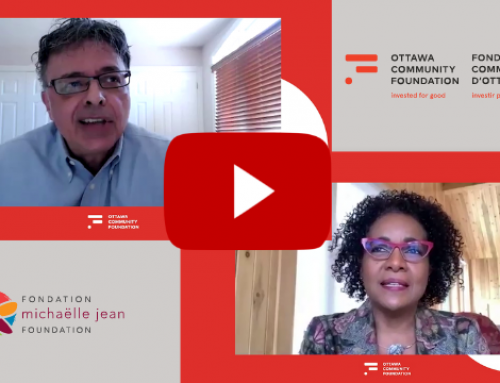Aaliyah McCormick – Public relations student speaks on her experience unlearning internalized racism as a biracial woman

We all know the saying “racism is learned or taught.” I believe the same can be said about internalized racism. As a biracial individual my life has been shaped by unique experiences, conflicts, understandings, opportunities, and accomplishments. There were moments in my life growing up where I believed I was the only person receiving that treatment that I was. I wondered why it had to be me, and what in my life had I done wrong to deserve this?
I am eternally grateful for The Michaëlle Jean Foundation, and similar organizations because of their dedication to issues that affect young people such as myself, that motivate me to be proud of my ethnicity, and be confident when addressing and navigate racism. In these short stories, I will take you through my life from childhood to the present. Concentrating on my struggles, obstacles, and how I overcame them to be the woman that I am today, mentored by the FMJF.
As a young child, my grandmother would drive me to kindergarten and pick me up after school because my mother was working around the clock. I loved to go over to my grandparent’s house on the base after school, my grandmother and I would bake sweets, go to the park, read and do homework together. It was the first time in my life I felt I was part of a real family, and I was genuinely cared for and loved by the people around me. This feeling of contentment was short-lived, my mother and my grandparents got into a fight revolving around my biological father’s descent as a Jamaican man, and my skin color. I did not see my grandparents or the rest of my family from that point on.
This was a very difficult time for me. I had to realize that I did not have my father, his side of the family, and now not even my mothers. I felt incredibly alone, and I felt it was all my doing for being the only “Black McCormick”.
Kindergarten was another learning experience for me. After losing contact with my family, my mother dropped me off at school an hour early every day. One afternoon a group of white girls in my class saw my mother pick me up. The next day, they teased me, saying that I was adopted. They did this continuously for months. I tried standing up for myself, promising them I wasn’t adopted, but their taunting persisted. They asked me why I was Black, and my mother was like them. At six years old, I did not have an answer to this question. I recall coming home from school multiple times and running to the bathroom and washing my hands for hours. I would scrub them until I tore the skin, just wishing that my brown color would fade away.
In grade school, there was a clear divide between the Black and Caucasian students. I would get countless questions about my hair, “Why is it so frizzy? Why does it look like that? Can I touch it? How do you brush that thing?” The questions did not bother me so much, but the complaining did. One day in class, a student sitting behind me squawked to the class, “I can’t see because of your huge hair!” I looked up, the entire class had their eyes on me, many of them laughing, I was devastated. I remember going home that night and begging my mother to let me stay home the next day, but she reminded me that no one could watch me, and I was far too young to stay home alone.
For the rest of my elementary and middle school experience, I did not let anyone see my hair down. I would wear my hair in a low tight bun every day, and night. I started to hate my hair. I already hated my skin. I was starting to hate who I was, and where I came from.
In high school, I noticed that my peers were becoming more devious with their comments and insults. Being Black, it was quite difficult for my classmates to wrap their heads around me being a vegetarian. Repeatedly I would hear comments like, “How do you not eat chicken when you’re Black? How are you even Black if you don’t eat chicken? “You’re not a real Black person because you don’t love chicken.” I was also teased about my body shape in derogatory terms. I was tormented about the genre of music I listened to because of the colour of my skin.
My previous encounters with conflict had prepared me quite well for this time in my life. I did not react in any way. I did feel mentally burdened by the situations, but most importantly I did not feel negative about myself or my heritage. I carried this mindset forward into my working life.
After graduating high school, I started a job at a clinic/pharmacy as an unregistered pharmacy technician. One day, one of my clients came into the pharmacy and requested a bottle of water, which we gave free to our clients. I went over to the fridge to get her one and her response was, “No not from you, I don’t get served by you people.” Then one of my white co-workers went over and gave it to her. She had no problem being served by her. I did not react to the situation, but my manager was very uneasy, he spoke with her and made her apologize. I accepted her apology knowing it was not sincere. She mentioned not knowing where her comment came from, due to her having a biracial granddaughter. This only concerned me and made me empathetic towards that little girl, and her relationship with her grandmother.
All of these experiences, the tormenting, the racist comments, the self-hate and my journey to self-acceptance as a Black woman have made me realize that racism needs to be addressed much earlier on with children, and mended for the younger generation. We cannot keep molding young minds into hating themselves, where they come from and developing internalized racism. We all have a duty to teach younger generations to be strong-minded, willful, determined and most of all honored to be the colour that they are. This is why I chose a career in public relations, to communicate with my community and hopefully one day the world, my goals, and aspirations to better the lives of minority youth. The Michaëlle Jean Foundation is just the beginning of my conquest.









